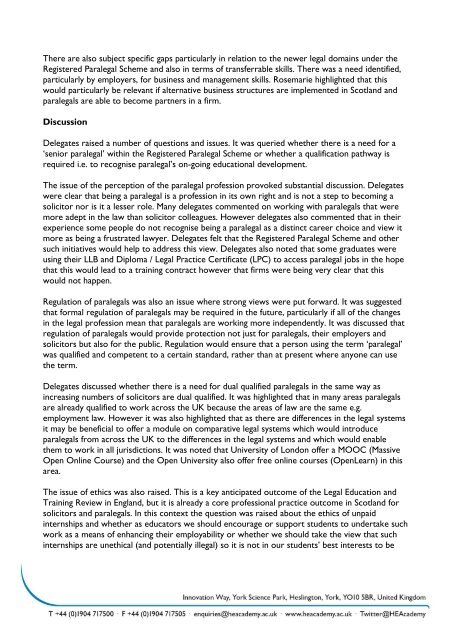Event Report (PDF 111KB) - Higher Education Academy
Event Report (PDF 111KB) - Higher Education Academy
Event Report (PDF 111KB) - Higher Education Academy
Create successful ePaper yourself
Turn your PDF publications into a flip-book with our unique Google optimized e-Paper software.
There are also subject specific gaps particularly in relation to the newer legal domains under the<br />
Registered Paralegal Scheme and also in terms of transferrable skills. There was a need identified,<br />
particularly by employers, for business and management skills. Rosemarie highlighted that this<br />
would particularly be relevant if alternative business structures are implemented in Scotland and<br />
paralegals are able to become partners in a firm.<br />
Discussion<br />
Delegates raised a number of questions and issues. It was queried whether there is a need for a<br />
‘senior paralegal’ within the Registered Paralegal Scheme or whether a qualification pathway is<br />
required i.e. to recognise paralegal’s on-going educational development.<br />
The issue of the perception of the paralegal profession provoked substantial discussion. Delegates<br />
were clear that being a paralegal is a profession in its own right and is not a step to becoming a<br />
solicitor nor is it a lesser role. Many delegates commented on working with paralegals that were<br />
more adept in the law than solicitor colleagues. However delegates also commented that in their<br />
experience some people do not recognise being a paralegal as a distinct career choice and view it<br />
more as being a frustrated lawyer. Delegates felt that the Registered Paralegal Scheme and other<br />
such initiatives would help to address this view. Delegates also noted that some graduates were<br />
using their LLB and Diploma / Legal Practice Certificate (LPC) to access paralegal jobs in the hope<br />
that this would lead to a training contract however that firms were being very clear that this<br />
would not happen.<br />
Regulation of paralegals was also an issue where strong views were put forward. It was suggested<br />
that formal regulation of paralegals may be required in the future, particularly if all of the changes<br />
in the legal profession mean that paralegals are working more independently. It was discussed that<br />
regulation of paralegals would provide protection not just for paralegals, their employers and<br />
solicitors but also for the public. Regulation would ensure that a person using the term ‘paralegal’<br />
was qualified and competent to a certain standard, rather than at present where anyone can use<br />
the term.<br />
Delegates discussed whether there is a need for dual qualified paralegals in the same way as<br />
increasing numbers of solicitors are dual qualified. It was highlighted that in many areas paralegals<br />
are already qualified to work across the UK because the areas of law are the same e.g.<br />
employment law. However it was also highlighted that as there are differences in the legal systems<br />
it may be beneficial to offer a module on comparative legal systems which would introduce<br />
paralegals from across the UK to the differences in the legal systems and which would enable<br />
them to work in all jurisdictions. It was noted that University of London offer a MOOC (Massive<br />
Open Online Course) and the Open University also offer free online courses (OpenLearn) in this<br />
area.<br />
The issue of ethics was also raised. This is a key anticipated outcome of the Legal <strong>Education</strong> and<br />
Training Review in England, but it is already a core professional practice outcome in Scotland for<br />
solicitors and paralegals. In this context the question was raised about the ethics of unpaid<br />
internships and whether as educators we should encourage or support students to undertake such<br />
work as a means of enhancing their employability or whether we should take the view that such<br />
internships are unethical (and potentially illegal) so it is not in our students’ best interests to be
















